#it's not consistent and probably not intentional
Explore tagged Tumblr posts
Text
Time, Erudition, and Destruction
I've written before about how time in Amphoreus is essentially a jumbled mess, and playing 3.4 makes me even more convinced that this is entirely intentional--between Khaslana and Trailblazer literally time traveling, cycles happening upon cycles, time's progress being actively "regressed," and Cyrene (the representative of Time) being forcibly removed from the equation, it's little wonder that "time" in Amphoreus seems to be essentially collapsing on itself, completely malleable to the manipulations, memories, and reductions of those pulling the strings of the story's plot.
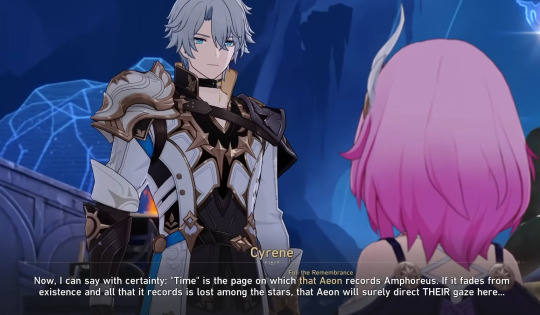
According to Cyrene, "time" is directly linked to the aeon of Remembrance, and therefore memory is inextricably linked to the passage of time in Amphoreus's story--making both central to the deepest remaining mysteries of Amphoreus's plot.
So, I wanted to take a bit to try to shuffle out my thoughts on where the plot is currently and where it may be going. This is almost all speculation, so take it with a grain of salt, but here's a bit of deeper dive on what I think 3.4 is laying out for us:
First, the issue of Amphoreus's time itself: There's still confusion about which cycles some events are taking place in, and major events are intentionally being shown to us out of chronological order. For example, when the Trailblazer appears in Aedes Elysiae as part of Phainon's "memory" of Cycle 0, Cyrene states that she's experiencing "deja vu" and makes several other comments throughout this memory walk hinting that she knows the Trailblazer is not the imaginary "Hero Within" friend she and Phainon created but an actual person from the future.
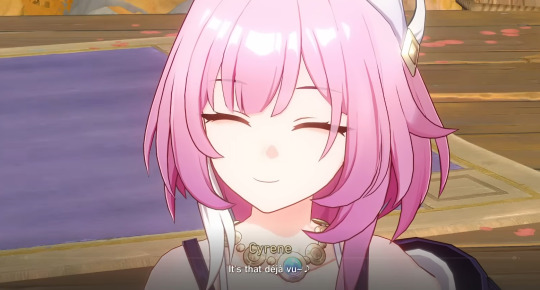
Some of this can be chalked up to Hoyo's cheeky habit of implying that HI3rd expies are "meeting the player again"--they did this with Acheron as well, just to hand wave it in Acheron's farewell as "Oops, my memory is kinda bad; this actually was our first meeting." Some of Cyrene's early connection to the Trailblazer probably can be chalked up to the "You're our imaginary hero-shaped friend" aspect. However, some of it feels far too intentional, calling deliberate attention to the collision of the future and past:
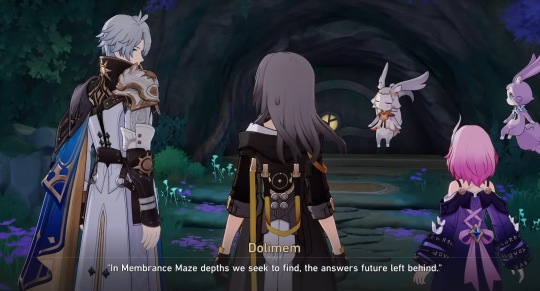
At the very least, I think the devs hit this note too often, and too consistently, to not also be implying something else: Cyrene already, even in Cycle 0, had memories she (theoretically) wasn't supposed to have yet and knowledge of the Trailblazer, specifically, that she doesn't currently seem to have any reason for having.
Tiny sidenote here, but the fact that it was hinted all along that our!Phainon from Cycle 33,550,336 is not actually named Phainon now makes no sense with the reveal that everyone in Cycle 0 Aedes Elysiae, in fact, calls him Phainon (including his parents and the fairies), and that "Khaslana" appears to actually be a name bestowed on him after the fact to associate him with the Worldbearing titan/Khaos. (Technically this means we still don't know what our!Phainon was actually named, unless of course it's also just Khaslana because memories of previous cycles somehow bled into later cycles despite the deadloops being referred to as "regressions" which implies deleting and starting again.)
Anyway, back to the main point again: The Chrysos Heirs that appear as "visions of Phainon's future" in Cycle 0 actually seem to be heirs of some other cycle entirely. Mydei refers to Phainon as Phainon, which he didn't do in Cycle 0, and talks about his duel with Flame Reaver, which also didn't occur in Cycle 0.
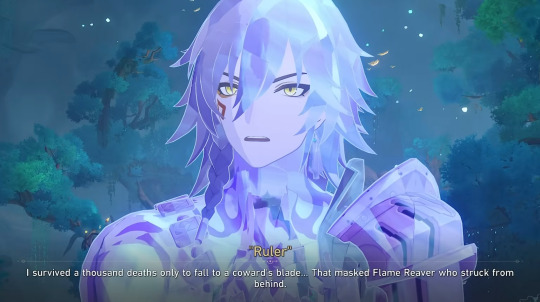
Theoretically, we're in Phainon's memory here, and at first glance, it might make sense to say that his memories may be jumbled from multiple cycles. Except we're supposed to be in our!Phainon's memory at this point, not Khaslana's (as this moment supposedly takes place before our!Phainon kills Flame Reaver), so our!Phainon should not have memory of Cycle 0 at all yet.
Of course, the more likely possibility is that we were never in Phainon's "real" memory at all, and instead were just temporarily removed to the "buffer zone" by Lygus, where he showed us a (possibly intentionally) jumbled set of memory data from "Phainon" based on what he (Lygus) wanted us to see.
It's intentionally confusing.
At another point, the dev team deliberately disguises which cycle we're in using ???:
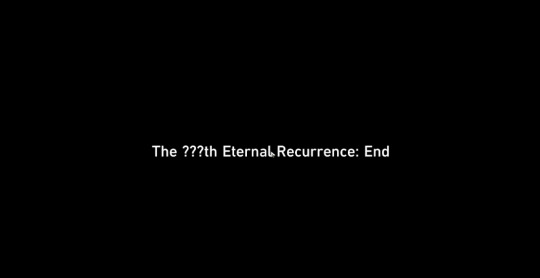
Why do this? It had already been revealed right from the beginning of the patch that we were in the 33,550,336th cycle. There was a literal running countdown throughout Phainon's entire Khaslana sequence giving us the exact number of cycles Khaslana would reach by the end. For what purpose would the devs list a scene as occurring in the ??? cycle... if not to deliberately obscure which cycle we're really in?
Furthermore, there's the question of whether what happens in this ??? scene (supposedly our!Phainon's fight with Flame Reaver) even really can be from the 33,550,336th cycle, given that Flame Reaver is suddenly able to speak in clear full sentences again, despite supposedly being so degraded by the actual 33,550,336th cycle that he seems to struggle to form coherent thoughts.
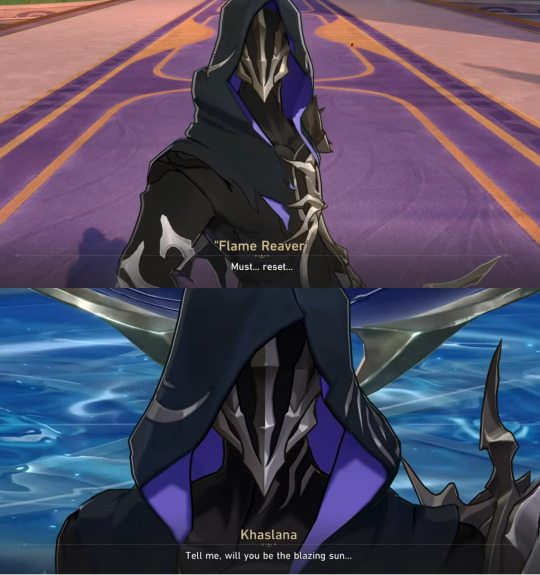
When is this scene really taking place, hmmm Hoyo?
(Okay, I might just be thinking into things a bit too much here, but seriously--why the "???" marks?)
Along the same lines, there's something interesting if you go back to 3.3 as well. I mentioned scenes being shown to us out of chronological order, and the ending 3.3 is a perfect example of this. Many of us were confused at the end of 3.3 when Phainon seemingly has no issue with Cyrene being alive out of nowhere. 3.4 resolves this by suggesting that we were actually being shown the ending of Cycle 0 at the end of patch 3.3.
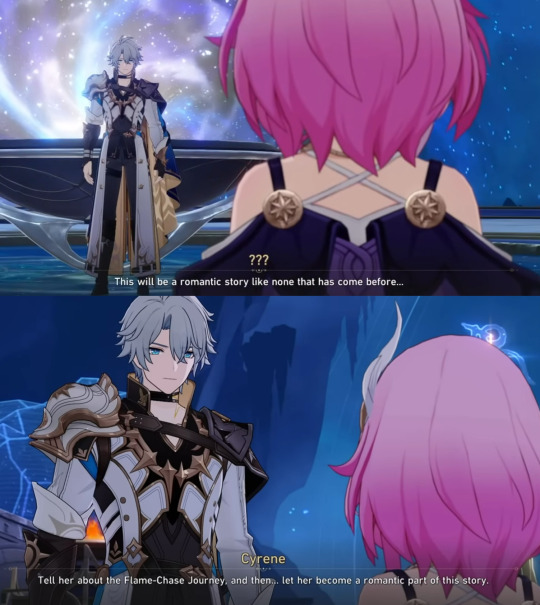
However... There's something not quite right about this either. Because in 3.4, Cycle 0 Phainon is fully aware of Cyrene, and they walked into the Vortex of Genesis together, facing Lygus as a team.
However, during 3.3, "Phainon" acts surprised to see Cyrene there at first, suggesting that he did not expect her to appear:
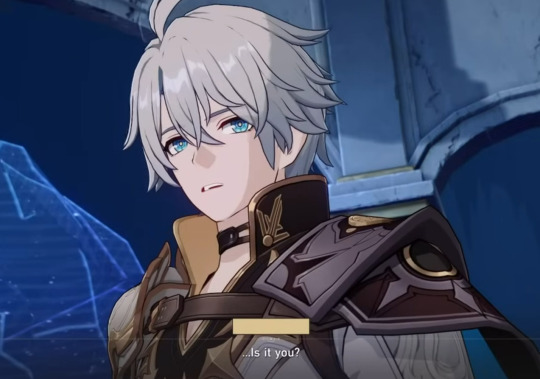
The scene shown at the end of patch 3.3 is not the ending of Cycle 0.
...So when is it?
There's also this, which still hasn't been sufficiently explained:
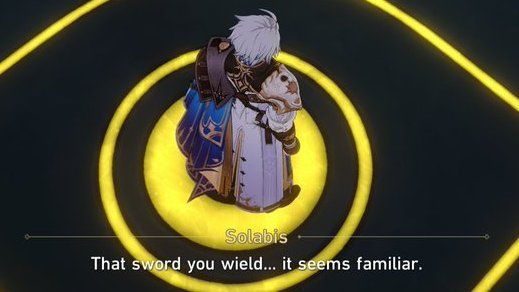
This implies that either the Flame Reaver/Khaslana of the 33,550,336th cycle made some attempt to go after Seliose and her companions... or there's some additional time travel still ahead of us.
At the end of 3.4, Mem says she'll send Trailblazer back to the "beginning of time" but also suggests that we'll continue to meet each other in new cycles. Mem also says that Cyrene is waiting in the "future," while the book says "in the past," suggesting that these two are essentially the same thing--the Trailblazer's future is Amphoreus's past, intertwining and recursive like a mobius strip.
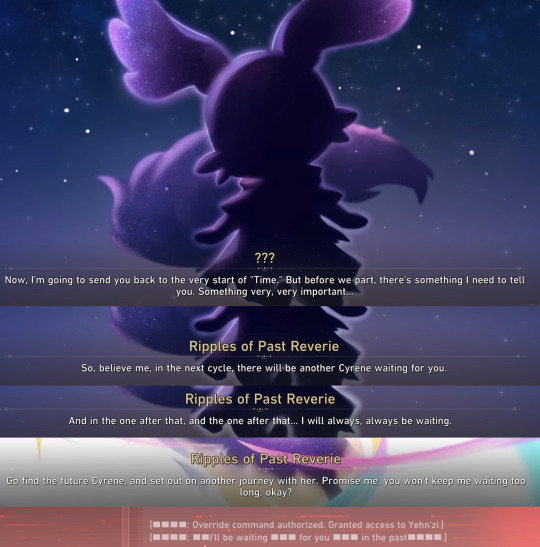
Overall, the impression this gives is that we may be headed into some sort of stable or semi-stable timeloop, and that the Cyrene of the future feels deja vu when meeting us because the Cyrene of the past already has. This is sort of alarming, as it could possibly suggest that we're not going into the past to successfully change it, to erase all the long years of Phainon and Cyrene's suffering; rather, we may just be closing a loop that already existed from the start, which would mean that all the actions which led to us going into the past in the first place would be inevitable...
Time travel plots are honestly kind of the worst lmao.
The concept of time in relation to Cyrene is also complicated in general, because who is it that has been trapped in the path space outside Amphoreus this whole time? Obviously it's Cyrene, but which one? Is it Cycle 0 Cyrene, sent out by that first time Phainon killed her? If that's the case, then who has Mem been the whole while? Has Cyrene's consciousness slivered into two (or more), allowing her to both exist outside Amphoreus and to exist inside it as a sentient being at the same time? (Never mind that this also calls into question how Cyrene could exist outside Amphoreus at all if they haven't yet been actualized into "real people"--she mentions that her "soul" will travel to some distant corner of the world and sleep, but at what point do electrical signals inside Amphoreus gain souls? The log suggests that Phainon may have crossed the "intelligence singularity" at the end of the 33,550,336th cycle--but Cyrene seems to have crossed it at Cycle 0?)
There's also the question about how Cyrene was able to do any of this. Theoretically in Cycle 0 she became Oronyx's demigod and therefore became a stand-in for the concept of Time itself; however, the "As I've Written" log updates clarify that all the power bestowed by the coreflames is actually just a heightened level of administrative privileges, allowing those who wield the coreflames to manipulate the simulation in ways that non-coreflame-wielders cannot:

The log also states that Phainon and Cyrene attempted to create a logic rupture by removing Cyrene (the concept of Time itself) from Amphoreus. However, by the point in Cycle 0, all the other demigods were also dead, and we know that the entire point of the OG cycles were for the Chrysos Heirs to die and be "reborn" as the next extrapolation's titans; therefore, the demigod of Oronyx would have died thousands of times inside Amphoreus already. How did killing Cyrene at the end of Cycle 0 do something different to "time" than what was already programmed and planned with the death of the other Oronyx Chrysos Heirs?
And how does "killing me in each cycle will send you back in time" even work, if Cyrene was not Oronyx's demigod in each cycle? Does Cyrene have actual control over time entirely separate from Amphoreus's extrapolations? If so, how?
(My head hurts, to be honest. I should know better than to think this hard lol.)
But, even more intriguing to me is how all this leads up to even bigger questions, the first of which is "What is Lygus even waiting for?"
In 3.4, Lygus states that the experimental question behind Amphoreus was already solved as of Cycle 0, and that none of the individual Chrysos Heirs, including Phainon and Cyrene, actually mattered much at all beyond being a tool for refining Irontomb.
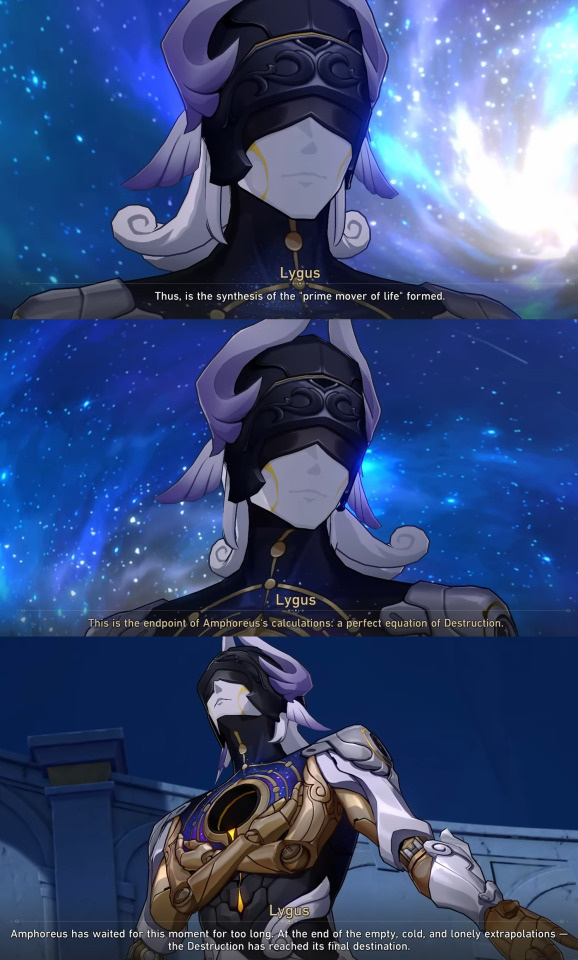
The only thing remaining between Lygus and his "Era Nova" is, according to Lygus himself, someone needing to step up and receive the gaze of Nanook to actualize the Scepter as a Lord Ravager.
But this... doesn't actually make much sense? The Scepter itself had already been gazed at by Nanook in the original 50,121st cycle. It was already a Lord Ravager long before Phainon and Cyrene ever existed!
Moreover, the simulated model of Destruction contained in it (the "Black Tide") was already deployed in other galaxies to near perfect success even before Phainon and Cyrene completed Cycle 0.
Why would a second gaze from Nanook, specifically to Phainon and/or Cyrene, actually be necessary?
Is the answer to the "equation of Destruction" really just people? Why does Lygus need Phainon and Cyrene Co. to "become real" in order to deploy an already solved "equation of Destruction"?
Why does the Scepter need someone organic in order to, as the "As I've Written" log states, "self-crown"?
Hmmmmm. 🤔
Simultaneously, trying to unravel Lygus's real role in the plot raises another question: Who is actually in charge of the Amphoreus experiment? In the new "As I've Written," Lygus is listed as the administrator and refers to himself as the "prime mover" of the experiment. We know that someone has been controlling Amphoreus's simulated data enough to change the setting of the story (setting the world's civilization level to "classical" for example) and also to direct the system to begin iterating with the original Chrysos Heirs becoming titans, etc.
But if Lygus has the power to actually control the system that completely, why would he not just delete Phainon and Cyrene entirely when they revolted and refused to go through with his plan? Or, at the very least, why not tamper with their memory files to erase Cyrene's memory of the aeon and lead them both into the "Era Nova" he wanted? Why was the "administrator" not able to override Phainon's commands to regress each extrapolation back?
This, of course, leads to the impression that Lygus wanted Phainon and Cyrene to loop the system--OR that Lygus does not actually have control over the experiment, and he can only observe it.
I think the first one is the interpretation most players are going with: Lygus only stood to gain by Phainon collecting more and more coreflames, more and more hatred. It was possibly Lygus's plan all along to drive Phainon personally into becoming an avatar of Destruction.
But... if the equation was already complete by the end of Phainon and Cyrene's Cycle 0, why bother at all? Why prepare a "gift" for Irontomb if Irontomb was already a Lord Ravager and had already determined the perfect path to Destruction by this point? Lygus had already, supposedly, achieved what he wanted--so why keep waiting?
Why not just replace NeiKos496 and Philia093 with new heirs and actualize Irontomb instantly with no problem?
It doesn't make sense, does it? Either Lygus could not erase/replace Phainon and Cyrene by himself... or his actual plan isn't just to launch Irontomb.
He may actually be waiting (or aiming) for something else.
All of this relates back to my main conjecture after completing 3.4: I am almost certain that Lygus is not what he seems. I don't usually dive too deep into plot leaks, so I could be totally off, but... something is still not adding up here.
Cyrene and Phainon even bring it up, stating that Lygus could have achieved his goal instantly if he had just kept to the shadows and said nothing at all.
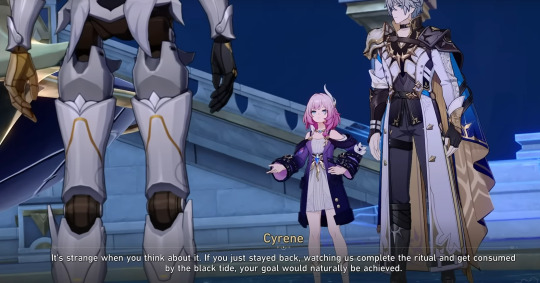
Phainon claims that Lygus chose to reveal himself and Amphoreus's connection to the Destruction because he was trying to cover up the fact that Amphoreus is also being gazed at by other aeons--but this makes no sense in practice.
How does Lygus revealing the existence of Nanook and Nous--thereby confirming the existence of multiple outside aeons--help to distract from those aeons? The game itself is even tossing it in our faces that if Lygus had said nothing, then Phainon and Cyrene would have gone straight into the Destruction without hesitation, which means that effectively, Lygus is the one who prevented Amphoreus from falling to the Destruction at the end of Cycle 0. Why? For what reason would Lygus have shared the truth of Amphoreus with Phainon and Cyrene, when it did nothing but--at least on the surface--seem to delay his plans at best, and completely derail them at worst?
When confronted about this, Lygus himself has absolutely nothing to say. It's literally just a blank close-up of his face. He never confirms or denies Phainon and Cyrene's claims, and he absolutely provides no answer for why he brought up the Destruction and the truth of Amphoreus to them in that moment. In writing, this is one of the most common and quickest ways to create red herrings: Character A makes an assumption, and Character B lets their assumption stand--only to reveal later that the assumption was wrong all along. Whenever there is an assumption ("Lygus is distracting us so that we'll go into the Destruction") that seemingly contradicts the character's actions ("Lygus's action here actually stopped Amphoreus from immediately going down the path of Destruction"), we have to question whether there is something more going on.
I mean, maybe Lygus really is just that over-confident and foolish. Maybe he's a straightforward, one-dimensional villain whose pride got the better of him here and he revealed all of this from sheer arrogance, confident that Phainon and Cyrene would never be able to stop him. Maybe he revealed all this because he wanted the regressions to happen right from the start, and Phainon's 33,550,336 cycles really were just Lygus's idea all along.
But the fact that we actually got a "Why would you reveal your plan to us like this?" callout in the writing of the scene itself is supposed to be a glaring red, entirely unsubtle flag for players--we're supposed to be going "Pump the brakes!! Something is NOT right here!!" My personal takeaway from the devs taking the time to literally go "Why would the villain be revealing his plan to us?" is that, of course, Lygus's actual plan has still not been revealed.
Lygus had a real reason for revealing Destruction and the plot to kill Nous to Phainon and Cyrene--but he hasn't actually told us that reason yet. Perhaps it is true that Lygus doesn't want Phainon and Cyrene to know what the other aeons are doing in Amphoreus--but doesn't that imply that Lygus, in fact, already knows what the other aeons are doing?
But if things aren't as simple as they seem, where does that leave Lygus though? If he still knows more than what he's revealed, if things in Amphoreus might still be going according to his plan, then what is the real plan? What is the real reasoning behind anything that is happening here?
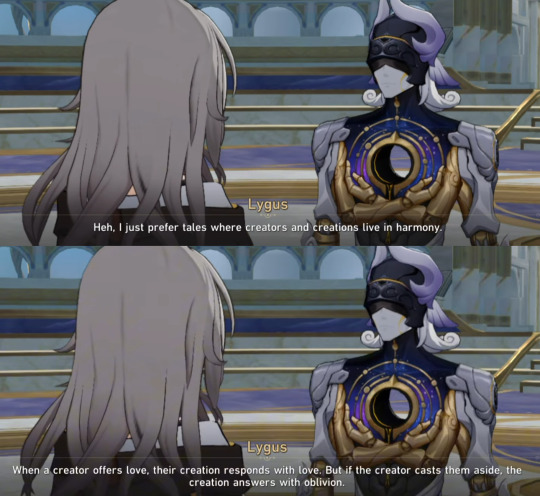
Before anything else, Lygus's pointed comments about creators and their creations--about the idea of abandonment by the creator--does seem genuine. The English VA work (while being very good) is quite different from the CN that I normally play with, with the English VA giving Lygus a very strong dose of barely repressed anger whenever Nous is mentioned. Nous is described "the source of all this tragedy" and Lygus reacts with visible frustration when the concept of being a "slave" to the gods is discussed.
Whoever is writing the logs in the new "As I'm Written" (seemingly Lygus, but there's always a possibility it's not) seems constantly fixated on the question of why Nous would abandon its "neurons," the Scepters.
This makes Lygus's plot smack, taken together with the comment from the "One-Day Talanton" questline, of the tantrum of an abandoned creation, striking back at their creator who left them alone. But in what way was Lygus abandoned by Nous, if that's who he's truly angry at? The game seems to suggest, at least so far, that Lygus is not actually Irontomb itself (Lygus refers to Irontomb as "you" in the new "As I've Written" as if it was a third-party object)--and only Irontomb has been described as abandoned by Nous so far.
So... Where is Lygus's rage actually coming from?
Did Nous abandon the Intellitrons somehow, in some way that hasn't yet been touched on by the plot? Or is Lygus's rage at abandonment actually Irontomb's "feeling"? Does Lygus's sense of abandonment and his desire to give a creator "oblivion" for casting its creation aside actually stem from Irontomb's being cut away from Nous's brain system? (WHO HURT YOU, LYGUS??)
Theoretically, there's precedent in the plot for this to be true. We're told in Gold and Gears that Rubert II inherited Rubert I's memories through the Anti-Organic Equation. Therefore, it's possible that Lygus is actually "Rubert III," having inherited the memories of Rubert I through the Anti-Organic Equation in the Scepter. This would align with the new "As I've Written," which suggests that the person writing the logs, presumably Lygus, is a recognized member of the Genius Society, as Rubert I was. (Or they're at least able to falsify their identity enough to pass as a GS member...)
If Lygus is a cover for a real Genius Society member, we know Polka Kakamond, Screwllum, Herta, Ruan Mei, Stephen Lloyd, and all the confirmed dead members are off the table. That leaves only those who either haven't been foreshadowed at all (or much), like Yu Qingtu, or those closer to the situation: Rubert I or someone close enough to Nous to have a personal grudge.
Lygus could very well be some Rubert I-Rubert II amalgamation reborn, furious at Nous for THEIR choice to abandon the Scepter system, perceiving it as a creator abandoning their creation to the cold abyss.
But there's also something weird going on with how Nous is described--because Nous is, in fact, a creation in and of itself, and THEY are described as a creation that paid their creator back with cruelty. The logs say that the moment Erudition was born, all genius, all thought, all knowledge in the universe became THEIR slave. Therefore, all members of the Genius Society (presumably including Lygus) are already slaves to Nous, even though it was a member of the Genius Society (Zandar One Kuwabara) who created Nous in the first place.
So if Lygus's anger is about a creation that hates its creator... then which creation and which creator are we talking about?
Nous creating Scepters--or someone creating Nous?
I cannot think it is accidental that Lygus's appearance is repeatedly mirrored to Nous's through the severed head and red "eye."
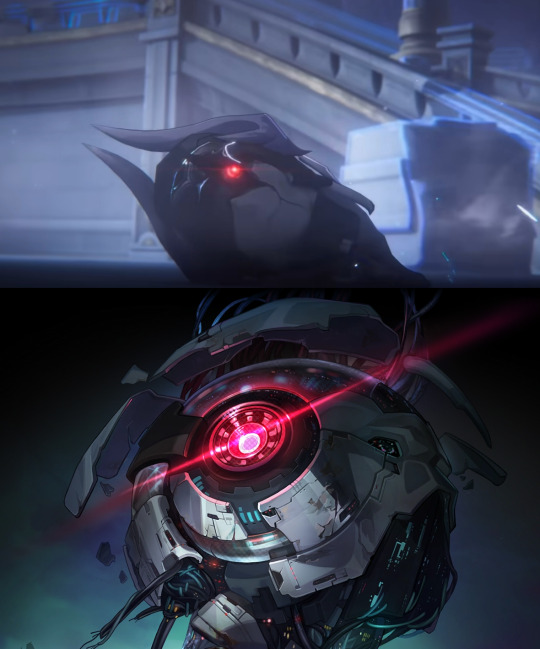
There's even the fact that Nous appears in Fu Xuan's memories as a man with his eyes covered, much the way Lygus's visor normally blocks his eyes from view.
This is just too close and too consistent (shown multiple times from 3.3 to 3.4) to be unintentional. Something is going on there.
(There's the other consideration too: Lygus says he likes stories where creations and creators get along and knows that creations that are treated poorly by their creators respond with violence--is Lygus not, sort of, Phainon's creator? Does he actually long for the oblivion that comes from abusing a creation?)
Anyway, to complicate the situation even further, there's also a third option about Lygus's plan: Perhaps all of this is nothing more than a ploy, with all of Lygus's anger being just a play-acting facade?
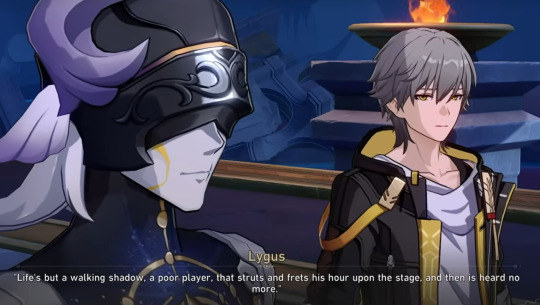
Could Lygus be pretending to take on Irontomb's hatred toward Nous in order to actually achieve a different end, to disguise his real plan behind the smokescreen of abandonment issues? Is Lygus's "anger" the real distraction to keep us from understanding where his actual allegiances lie?
Is Lygus's story a straightforward tantrum over being abandoned--or a clever ruse for an entirely different stance?
Your guess is as good as mine, because the game is extremely contradictory when it comes to Nous. The new "Fables About the Stars" video suggests that the Lord Ravagers see the downfall of Nous as the first step to winning the War of the Aeons--killing all intelligence in the universe will leave civilizations too weak and ignorant to defend themselves. Ergo, we could say that the Lord Ravagers actually view Nous as a force for good, protecting the universe from Destruction.
But Lygus--and others throughout both Gold and Gears and the Unknowable Domain--describe Nous as a slaver, a being whose very existence closes off all possibilities for the growth of intelligence, because simply by existing as the concept of Knowledge itself, all questions are already anticipated, all answers are already known. There is no meaning to seeking knowledge if all equations have already been solved, if all solutions have already be calculated.
Free will cannot exist if all possibilities have already been foreseen.

So is the Erudition a well-meaning being, the kind old man who warned Fu Xuan away from the pain she would feel from THEIR gift--or a cold and emotionless void that seeks ever more knowledge, even at the cost of life itself?
Let's not forget that it was the Erudition's tacit approval of the Anti-Organic Equation that put the final nail in the coffin for Nanook's home world and caused THEM to ascend as an aeon--Nanook's beef with Nous is personal.
In the war of concepts, does Erudition represent a net positive for humanity--or a dangerous pinnacle where we teeter on the brink of total intelligence collapse?
Tiny aside here, but I think it is also worth noting that just as Cyrene has weird timey-wimey wibbly-wobbly-ness going on, so too does Nous. The new "As I've Written" logs suggest multiple times that something is not quite right with the administrator's understanding of the timeline surrounding Nous:
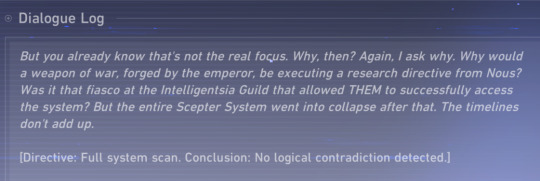
(This may also be related to the Gold and Gears moment where Ruan Mei notes that it should have been impossible, time-wise, for Rubert II to have had the connections he did to the first Mechanical Emperor's War--which the geniuses on the Herta Space Station debate about for some time.)
We are also told repeatedly throughout the game that Nous is linked to the idea of divination, because THEIR calculations are absolute, and THEIR predictions are (according to Polka Kakamond) always true. Nous's thoughts are not just thoughts but fixed points in reality, "INSTANCES" and "MOMENTS" that are said to anchor the very future of the universe:
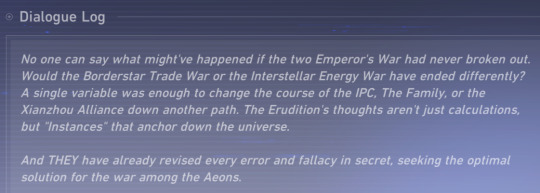
And if Nous already knows all things that will come to pass, has calculated all possible outcomes for the war among the aeons already...
Then wouldn't all of the Amphoreus experiment also just be Nous's own plan?
The "As I've Written" log literally suggests as much:

The game itself is playing with this concept extensively in Amphoreus, leading us time and time again to the conclusion that Erudition and Destruction are not opposed to each other.
While we could dismiss the unflattering image of Nous in Lygus's logs as pure propaganda, just anti-Nous rhetoric to convince the Scepter to target Nous specifically, there's the ring of truth in the idea that Erudition is not only a destructive path but also a self-destructive one as well.
We've received not one but two end-game modes about conflicts stoked specifically by Nous and/or their followers, with the knowledge that the Anti-Organic Wars completely reshaped HSR's cosmology, based almost entirely around the Erudition path's uncontrollable curiosity and unfettered desire for knowledge. In seeking more and more and more information, we know that many geniuses of the Genius Society have instead led their worlds (or others' worlds) into Destruction, such as Chadwick whose invention of the Imaginary Implosion Pulse resulted in the annihilation of 24 planets, or Rubert I and Dr. Primitive. Even Ruan Mei, ostensibly a "good guy" on our side, dabbles with horrific things like necromancy and resurrecting the Swarm in her pursuit of knowledge.
Although there are altruistic members of the Genius Society, the overall impression is that of a group which places their own personal intellectual interests above the safety of the universe, eschewing ethics and morality entirely if it means getting just that much further ahead in their research. (Screwllum even has to remind Herta once they make it into Amphoreus that she shouldn't get distracted with her own interests while people's literal lives are on the line, and Herta is one of the goodies.)
If the human followers of Erudition are willing to put aside ethics and empathy in the search for answers... What does that mean for Nous, the inorganic "brain" of the universe, whose only prime directive is to seek knowledge?
Does Nous care at all about the fate of universe--or only about finding the "answers"? Is the Erudition an aeon capable of loving life, like the very human Akivili? Or is Nous truly nothing more than a cold and rational computer, reducing all human existence to mindless lines of numbers and data, conducting horrific "thought experiments" using the real universe as its testing ground, terminating experiments without hesitation, and seeking answers even at the cost of life itself?
What if the "universe's answer" that Nous found... was an ultimate fate of Destruction? Would Nous help avert that--or steer us toward it instead?
The new "As I've Written" logs hint at this dangerous view of Erudition frequently, alongside the suggestion that Erudition is, by default, a self-destructive path.

Anaxa, who is aligned with Erudition's path in Amphoreus's simulation, is said to perfectly reflect Erudition's "self-destructive" tendencies, with the log suggesting that those who follow Erudition are not only willing to sacrifice others in their pursuit of knowledge, but even more willing to sacrifice themselves.
The act of learning can be, in itself, a form of destruction.
I don't have the time or energy to really expound on this thought the way it deserves, but the wording that so often surrounds learning is (even in real academia) frequently related to destruction--you can "tear away the veil of ignorance" or "destroy your previous conceptions;" knowledge can be "acquired" by force, and students often lament the collapse of their mental and physical health while they frantically work to complete their studies.
The pursuit of truth is both the most necessary hunt in existence and the most ruinous.
Just like Lygus's logs suggest, the rest of the game--and our understanding of the real world too--also suggest that there may already be inextricable links between Erudition and Destruction.
However, Amphoreus's plot is simultaneously inviting us to consider Destruction in a different light as well.

In Amphoreus's simulation, rather than "the end of all things," Destruction becomes a catalyst for growth and rebirth. Inside the Amphoreus simulation, extinction events are what allow evolution to flourish, the threat of destruction is what fosters an all-powerful drive to live, and through the constantly reiterating cycles of Chrysos Heirs killing and then taking on the role of the titans they've obliterated, the electrical signals inside the Scepter grow in strength and ability, approaching the "intelligence singularity" that will allow them to "become real."

In fact, it's only when Phainon achieves a state of pure Destruction and is gazed upon by Nanook once more that he appears to have possibly crossed this "intelligence singularity," implying that--through Destruction of the Self--Phainon, after being actualized from Irontomb, may be capable of becoming "true" life.
The conclusion that Lygus--and the Scepter and Nous--seem to have reached is that Destruction is, in fact, the prime mover of life.

Simultaneously both the end and the beginning of existence.
Again, this might be nothing but crazy, biased conclusions inserted into the system by Lygus in his bid to ensure Nous's destruction--but it does also have the ring of truth to it, doesn't it?
Our known universe itself began with a singularity, the "Big Bang" that "hurtles" galaxies through the cold, dark void, sparking the primordial fire that gave birth to stars. In virtually every world religion, a great destruction gives rise to new civilization--the Flood wipes humanity off the map, the plagues destroy Egypt to free the Hebrew people, Shiva (whose name means "kindness") destroys the universe in order to create it anew, resetting the eternal cycles as souls refine themselves of impurities on their path to liberation. Flowers must die in winter before they can be reborn in spring. Forests need fires in order to flourish. The hero on his Hero's Journey faces symbolic death in order to rise up as a new, better person.
Life and death--Thought and Destruction--are an endless cycle, maybe no different from Amphoreus's own endless cycles.
I want to pause here to include one more way of thinking about Destruction which I think Amphoreus's plot is heavily alluding to: The connection between Destruction and the concept of Chaos ("Khaos").
In ancient Greek mythology, the universe itself was born from Chaos, typically in conjunction with other deities/concepts such as "Gaia" the earth or "Nyx" for night. In the ancient Greek tradition, "Chaos" is not the wild, disorderly bedlam we might imagine from that word today, but instead a primordial void, containing simultaneously nothing and everything at once--the possibility of all things both good and bad.
This notion that the world began in a chaotic void is also present in many different religions--"Let there be light" in Christianity, for example--and has reached nearly universal cultural acceptance as people imagine the scientific origin of our universe itself as being a sort of endless black emptiness until the Big Bang singularity.
Thus, when we think of the start of existence itself, we think of "chaos" and the darkness of the void.
In other words: Khaos and Evernight.
In Paradise Lost, a text which HSR has actually referenced obliquely several times before, John Milton writes that all existence was born from "Chaos and Old Night," where "Night" is the beginning and origin, erasing but also containing all time and memory, and Chaos is the substance-nonsubstance all-encompassing seed of existence:
Before their eyes in sudden view appear The secrets of the hoary Deep, a dark, Illimitable ocean, without bound, Without dimension, where length, breadth, and height, And time and place, are lost; where eldest Night And Chaos, ancestors of Nature, hold Eternal anarchy, amidst the noise Of endless wars, and by confusion stand. For Hot, Cold, Moist, and Dry, four champions fierce, Strive here for mastery, and to battle bring Their embryon atoms: they around the flag Of each his faction, in their several clans, Light-armed or heavy, sharp, smooth, swift or slow, Swarm populous, unnumbered as the sands Of Barca or Cyrenè's torrid soil.
Milton describes his conception of Chaos in Paradise Lost as "the womb of nature and perhaps her grave," full of the "dark materials to create more worlds." In another of Milton's work, his treatise on Christianity, Milton describes Chaos as "not an evil thing, nor to be thought of as worthless: it was good, and it contained the seeds of all subsequent good.”
Thus, for Milton--and for the many, many pieces of media inspired by his views--Chaos is a thing of both good and evil, containing all possibilities for Destruction as well as Creation.
It shouldn't be hard to make the connection to HSR here. We are told repeatedly that inside Amphoreus's simulation, electrical signals possessing certain ideologies all began to name themselves after "Khaos."
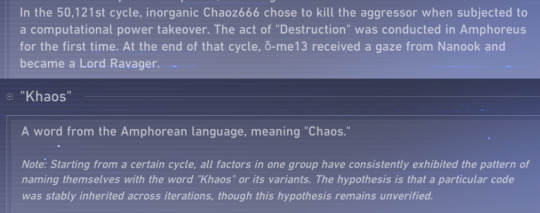
It was Chaoz666 that caused Irontomb to be recognized as Lord Ravager by Nanook, and later "Khaos" who became Kephale, bearing the world on his shoulders as the model for Phainon to follow. Phainon's own bestowed name "Khaslana" is actually "Khaoslana" in Chinese. Ergo: Phainon is the representative of the oldest meaning of "Chaos"--not mindless, disorganized hatred, but the potentiality of all things, bearing the chance for Destruction and Creation in equal capacities.
And if Phainon, Destruction's avatar, is a vessel containing the seeds of good, the "dark materials to create new worlds"... What does that say about Destruction itself?
Is Nanook the culmination of entropy, the heat death of the universe, the process by which all things will eventually reach Finality?
Or, as the Scepter has concluded, is Destruction actually the prime mover of life, the end of one cycle so that a new cycle can finally be ushered in?
Will the power of Destruction in Amphoreus be used to end life--or to create it?
In our oldest of legends, Chaos--all good and evil, all beginnings ends, all destruction and creation in one--combined with time and memory (the Evernight), to create the world as we know it, bringing true life into being from the void.
Make of that what you will.
To me, by far the most interesting element of patch 3.4 was not Phainon's individual suffering, sad as that was. Instead, the most powerful part of 3.4 was definitely the questions it raises about the aeons.
Thought goes hand-in-hand with existence ("I think, therefore I am"). Death goes hand-in-hand with time ("Memento mori"). Destruction encompasses both the end of thought (Erudition) and the beginning of memory (Remembrance).
Amphoreus is asking a series of very interesting questions on the cosmic level: Are Erudition and Destruction two sides of the same coin, does Destruction goes hand-in-hand with life, and what does this all really mean for the upcoming "War of the Aeons"--leaving me with perhaps the most important question of all:
If Finality truly means the end of all things forever, would Destruction--with its possibility of rebirth, of evolution from the ashes--actually be the better choice?
Amphoreus is a world that has "died" and been recreated millions upon millions of times, blessed--or cursed--with Nanook's golden blood, and poised to ultimately be "reborn" into true life from the destruction it has experienced.
It's very hard to miss the symbolism suggesting that the power of Destruction is actually essential to escaping endless futility and stagnation into non-existence.
The meal is tastyyyyy; thank you Hoyo.
So, all in all, the biggest 3.4 takeaways:
Phainon and Cyrene are almost certainly going to be able to use their powers (perhaps combined with[in] the Trailblazer) as Chaos and Old Night to give Amphoreus the "birth" it deserves to become its own world.
Lygus's actual plot is still entirely unclear, and his seeming hatred for Nous is complicated by many outside factors that may be obscuring his true intentions, not the least of which is still the clearly distorted sense of time and looping going on inside Amphoreus. We have no way of knowing at this point why he's so gung-ho about making Phainon and Co. into "real people" and what he actually thinks about the Scepter's conclusion that "Destruction is the prime mover of birth." I can't stop laughing, someone please give Nanook a baby.
Nous may or may not be entirely intertwined with the notion of Destruction, as much a force for annihilation (and self-annihilation) as Nanook.
Nanook may not represent, for Amphoreus at least, what it seems on the surface, and the power of Destruction will almost certainly be essential to bringing Amphoreus into the true Era Nova it deserves.
Phew! That's my thoughts, anyway!
#honkai star rail#phainon#lygus#nanook#cyrene#patch 3.4 analysis#hsr 3.4 meta#hsr spoilers#3.4 spoilers#if Nous already knows how to win the War of the Aeons#could it be that that victory requires the presence#of a Lord Ravager who *opposes* Nanook#an avatar of Destruction whose truest core trait is “love”?#JUST SAYIN#I need a nap after writing this#all the thoughts out on the blog#so now my head can finally be empty
93 notes
·
View notes
Text
alright. let’s talk about continuity.
or, the reason you say “BUT IF SHIFTING AND MANIFESTING ARE INSTANT, WHERE IS IT?!”
SCIENTIFIC / DEEPDIVE
you want to know why your instant manifestation hasn’t “shown up.” why you can say something with full intent, feel the shift, know it’s done, but still sit in a body that feels the same, stare at the same walls, watch the same numbers blink on a screen that doesn’t reflect your declared truth?
because you’re still operating inside continuity. that’s not a guess. that’s not a cute metaphor. that’s exactly what’s happening. and unless you understand the mechanics of how that works, how it literally builds the perception of your current reality, you will stay stuck thinking something “went wrong.” nothing went wrong. your shift didn’t fail. your assumption wasn’t weak. the desire isn’t out of reach. what’s happening is you’re running your god power through the same fucking logic filters you used before you even knew you had it.
let me break it down.
continuity, in psychological and perceptual terms, is the internal framework that makes your world feel coherent. it’s what allows you to track cause and effect, to retain identity, to process the passage of time and link experiences together with a narrative. and for a human life? it’s useful. necessary, even. without continuity, your mind would shatter every morning trying to figure out who you are. it’s the glue that says, “this cup was on the table five minutes ago. therefore it should still be there now.” or “my friend was angry yesterday. unless something happened, they’re probably still angry today.” or “my hair was short last night, so it can’t be long today unless i remember it growing.” continuity builds “reality” by taking assumptions and stamping them across time.
but here’s where it gets important.
continuity is not fact.
continuity is an assumption.
continuity is a script your mind runs to keep things stable, predictable, and “realistic” and that script is malleable.
you’re not “seeing” your manifestation? not because it’s not there. but because your continuity script is telling your senses, “filter out anything that contradicts the past. smooth the edges. preserve the illusion of a timeline.” it’s not lying maliciously.
it’s doing what it’s always done: preserve a system you never told it to stop preserving.
think about that. you say, “i am rich,” and your reality should reflect that. instantly. and technically, it does. in the 4D, in the assumption layer, the command is registered. the choice is made. the declaration is reality. but if you then go check your bank account, or peek at your inbox, or look for signs, or analyze how long it’s been, you are doing something very specific. you are reactivating continuity. you are telling your mind, “cross-reference this moment with previous data. check for logical progression. confirm consistency.” and that instruction overrides the shift. not because the assumption wasn’t valid, but because your perception system just prioritized continuity over override.
because yes—continuity is stronger than desire.
continuity is stronger than a one-time affirmation.
continuity is what lets people stay broke while affirming wealth. what keeps people sick while affirming health. what lets someone know the truth intellectually but still feel trapped in the loop of “not yet.” because their continuity script is still active. their mind still believes reality must behave like a movie:
setup → development → payoff. and that script, unless suspended or rewritten, will filter out any contradictory data, no matter how real it is.
Let’s break it down using science.
PERCEPTION IS NOT PASSIVE. IT’S SELECTIVE.
your senses don’t give you “truth.” they give you signals. raw light, sound, touch, taste. your brain builds reality based on what it decides is relevant. this is done through predictive coding, a neuroscience model that says the brain doesn’t just wait for external info. it constantly generates predictions based on past experience, beliefs, and expectations.
you don’t see the world as it is.
you see the world as your brain expects it to be.
that means when you affirm “i’m in my DR” or “i have a million dollars,” your brain says “great. got it. now… does this match my current model of what’s real?” and if the sensory input, bedroom walls, bank balance, reflection in the mirror doesn’t line up with that expectation? predictive coding kicks in and discards the mismatch. your brain LITERALLY deletes information that contradicts its model of reality.
that’s not metaphysical. that’s Friston’s Free Energy Principle, one of the most influential neuroscience frameworks in modern cognitive science.
your “reality” is just the brain minimizing error between what it expects and what it receives. so if you’re affirming something once, but still expect lag, still subconsciously prepare for delay, still glance at the mirror and brace for disappointment? the brain doesn’t adjust to your command. it loops your expectation.
MEMORY: WHY “I’VE ALWAYS BEEN” > “I’M BECOMING”
the hippocampus is the part of the brain that organizes episodic memory, memories that feel like part of your life’s storyline. now here’s where it gets interesting: the hippocampus doesn’t distinguish between real and imagined experience when encoding memory.
when you say “i’ve always had clear skin” and feel it as a memory? you are literally altering the timeline your hippocampus stores. this is proven in neuroimaging studies on future imagination and memory overlap, where participants activated nearly identical neural networks whether they were remembering the past or imagining a future scenario in full detail.
what does this mean for you?
you want to shift instantly?
you don’t declare “i have this now.”
you declare “i’ve always had this.” because the brain doesn’t “switch timelines” unless the old one is fully replaced. not just overwritten in content, but in structure.
you erase the need for transition by erasing the memory of transition.
because if the hippocampus encodes experience based on story, then remove the story.
you’re not going from brown hair to blonde.
you’ve always been blonde.
you’re not in your 3D body hoping to shift.
you never left your DR. the 3D was a nap. a glitch. a dream.
TEMPORAL CONTINUITY: THE BRAIN’S FAVORITE LIE
ever heard of chronostasis?
it’s the illusion that time “jumps” when you shift your gaze, like when you glance at a clock and the second hand seems to freeze for a moment. this is the brain literally filling in time to preserve continuity.
same with change blindness, you can show someone two images with big differences, and unless they’re pointed out, the brain simply refuses to see the change. it assumes stability because… well, it expects it.
this proves one thing:
time, change, and memory are not linear. they are inferred.
the moment you affirm something new, the data can update instantly.
but unless you declare “this is normal. this is baseline. this is how it’s always been,” your brain will try to stitch it into the old model, forcing it to obey old cause-effect logic.
you say “i’m rich” and expect a bank alert? that’s external sequencing.
you say “i’ve always had money and this is normal”? that’s internal overwrite.
guess which one the brain follows faster?
THE SYSTEM IS CODED TO OBEY BELIEF. PERIOD.
a 2007 study on placebo effects showed that belief alone, not the pill, not the ritual, not the context, activated healing systems in the brain.
same with neuroplasticity: the brain physically rewires in response to belief-driven focus and repetition, not physical change.
belief drives structure. not the other way around.
if you believe the change is already real, your brain reroutes perception, memory, identity, and emotion to match that belief.
so when people say “instant manifestation doesn’t work,”
what they’re really saying is: “my belief hasn’t restructured the system yet.”
not because the assumption didn’t register,
but because continuity is still running the OS in the background.
TL;DR? HERE’S YOUR SYSTEM MAP
• the assumption is the input.
• the belief is the operating system.
• the continuity filter is the gatekeeper.
• and the senses are the laggy ass projectors playing last week’s update.
so what’s the solution?
you have to declare a system-wide update. not just “i am rich,” but “this world no longer runs on continuity.” not just “i shifted,” but “this reality reflects instantly, without logic, without narrative, without memory.” because if you don’t, your mind will still try to play by old rules, even while affirming new ones.
you can script and say:
• i do not experience transition.
• i exist in a world without cause and effect.
• the now is all there is, and it is self-contained.
• my reality updates instantly, with no story, no sequence, no reason.
• i do not need to track how things change. they are simply always true.
and more importantly? you have to live like that’s true. not wait for it to feel real, but decide it already is. because that’s the catch: continuity doesn’t break by waiting for proof. it breaks by ceasing to ask for it.
the moment you stop checking—stop evaluating whether it’s working—you’re unplugging from the narrative engine. you’re saying “i’m done playing this out like a book. this chapter doesn’t need a lead-up. this scene rewrites the past retroactively.” that’s the part most people don’t understand. to truly shift into the new version, you have to kill the one that was waiting.
not pause it. not evolve it. kill it.
because the self that waits to see the change is still in continuity.
the self that wonders if the mirror updated is still in causality.
the self that walks into a room and asks, “has it shifted yet?” is still processing through old logic. and every second you identify with that self, you reject the new timeline even while begging for it.
so here’s the hard truth:
if you keep asking “where is it?” you’ve already told reality “i don’t have it.”
if you’re still comparing your current view with your old one, you’re reinforcing the script that says “change needs proof.”
if you need a logical reason for why the new thing is here, you’ve already re-activated the mechanism that delays it.
to manifest instantly, to shift without lag, you need to declare not just the result—but the structure. the mechanics. the system update. you’re not just choosing an outcome. you’re choosing a method of rendering.
and that method? it’s either “reflection through logic and memory”
or “reflection through assumption and override.”
pick one.
you say “i live in my dr” and then live like it. even if you see the same bed. same mirror. same reflection. doesn’t matter. if you truly dropped continuity, then those things are part of the new reality. not remnants of the old.
but if you hesitate? if you peek back? if you ask for evidence?
you reattach the narrative leash.
and reality, loyal dog that it is, comes trotting back to the version you just left.
#law of assumption#loa success#loassblog#loassblr#shiftblr#shifting blog#loablr#loassumption#manifesting#master manifestor#affirming loa#loa tumblr#loa blog#law of manifestation#manifest#manifestation#nonduality#nondualism#shifting motivation#shiftingrealities#i shifted#shifting consciousness#shifting memes#shifting community#reality shifting#shifting#shifting antis dni#affirm and persist
93 notes
·
View notes
Text
I think it's fun and cute that everybody's reading some meaning into the character design choices for Kai's vision of his friends ("Nya has her pre-redesign hair because he still sees her as his baby sister!" and other such theories) but alas I think it's just another case of them mixing and matching character designs for shits and giggles because there is SO much extra-show material that has completely random assortments of design eras
#if you really look at it‚ you'll see Jay's got his curly hair‚ Zane's hair is kinda ambiguous‚ Lloyd's looks sorta in-between his two styles#and Cole and Nya have their old hair#it's not consistent and probably not intentional#nothin wrong with speculating about it! I love a good watsonian explanation#but on the doylist end of things. it's really not that deep lol#ninjago#ninjago monstrosity#ninjago spoilers#sometimes they just fuck with it for fun#remember the movie!Lloyd practice gi set where he had a blond version of Cole's old hair? yeah
77 notes
·
View notes
Text
it's really cool how almost all the "morally good" characters in cs have to be "pretty" and have anglocentric features and the villains and morally grey characters (specifically men) get to have non white features and by really cool i mean girl get up what the fuck
#i get either hunted for sport or ignored every time i say this so heres a few disclaimers so my words arent twisted#1. i have been into this show since 2019. i have spent at least 3 years trying to rationalise this to myself#i guarantee you whatever argument you can come up with has been considered and discarded already#2. no i am not taking this in bad faith no i am not “looking for things to get mad at”#i dislike saying this as much as you dislike hearing it. i love this show as much as you do probably more or i wouldnt still be here#consistently for the past. what. 4 years#and thats just tumblr. if we take it from 2019 then 6 years#3. no i dont think this was their intention. no i dont think they are cartoonishly evil and should die#its indicative of ingrained societal biases and im getting pretty tired of clarifying that theyre still wrong for that despite#4. im putting this in the tags because its about cs. this isnt me being anti cs. be fr#the way that cs treated their non white characters is weird as hell. no one is saying you cant enjoy the show. i know i definitely do#but this is also the truth#okay if you guys piss on the poor after all that im killing you#carmen sandiego#carmen sandiego 2019#carmen sandiego netflix
62 notes
·
View notes
Note
as much as I like the dsmp story and its message about how there’s a deep down, I can’t help but think about the Bojack horsemen quote about how there’s no deep down and you are the actions you do regardless of someone’s intent or backstory
[context]
I believe you are referring to this quote “That’s the thing. I don’t think I believe in deep down. I kind of think all you are is just the things that you do.” (Which btw yall its real annoying when I have to find whatever the hell you are talking about, no shade just as an aside…<3)
The thing is, both things can be true. Life is about choices, and your every action and inaction has a consequence, (which I think I’ve talked about before but I don’t feel like finding it at the moment). In other words, everything you do impacts the world around you and has lasting effects. You may not know it and are likely very unaware of the consequences (positive and negative). This is because like my post said we are all inherently selfish because we live and see the world from only one view - our own. So yes, you are the actions/“things you do” and choices you make, regardless of the intentions.
At the end of the day, whether you meant to or not, whether you had good intentions or not, if you hurt someone the facts remain the same - you hurt someone. They have a fundemental right to feel hurt and that is always valid, emotions and feelings are always valid, whether it’s logical or makes sense or not. The reason deep down doesn’t change the outcome or the hurt you caused. However, that is about the past action. If you want to learn and grow and form meaningful relationships, avoid conflict… etc. That’s where the deep down comes in. Then it’s important to look at the reasons, not as excuses or justifications but as explanations - a bridge to understanding and shattering our stereotypes, assumptions and judgement.
(Okay, my foot still hurts from you stepping on it, but yeah if it was just an accident then the relationship doesn’t have to just all end over something stupid like it would if I assumed it was intentional.) Yes the impact you make on the world is the sum of what you do and that impact is true regardless if there is a deeper reason behind it. But also, if you only focus on what people do and go no deeper, then you are missing the bigger picture and your relationships will not last long and you are going to live a very lonely and conflictfilled life.
That is why it is important. Not because in the finale of the dsmp Dream’s reveal changes any of his actions, but because it changes our perspective of him and that changes how we act next. Whether we show compassion and empathy or understanding or forgiveness of someone’s actions or run the hell away. (Whether a conflict breaks out over you stomping on my foot so I step on yours back.)
As an engineer, a nerdy metaphor I could use is that it’s kinda like if situations were an equation then the effect and action is the answer (the one side of the =), but sometimes we need to used the other side of the = to solve for x, so we can solve the next equations.
The deep down matters because it should change your action. It matters because in recent years after excusing my behavior because of something or the other, I realized ya know other people might also have a valid reason too. So while my automatic assumption of why they are late to class is that they are lazy, or rude, or don’t care, maybe maybe they actually woke up nauseous and were throwing up which prevented them from being on time, maybe they fainted coming out of the shower, maybe their car wouldn’t start, maybe they had a doctor’s appointment beforehand, maybe there was a car accident making them late, maybe there was a train blocking the road…etc. there are so many reasons, but our mind just jumps to the worst, and we expect grace from others when we are late but wouldn’t give others the same benefit of the doubt. If we had, if instead of judgment and criticism, we checked on them after class to see if they are okay then maybe we learn of their struggle, and maybe they need our help, or maybe we relate and become friends, maybe you share your notes with them, maybe you give them a hug. The deeper meaning changes what you do and like the quote says, what you do is the impact on the world…
#sorry this got longe then intended but I feel like it is so very important to talk about… btw some of those excuses are how I became friends#with people or happened to me… anyways it’s taken a long time for me to get to a place to understand how both things are true… <3 <3 :)#dsmp#c!dream#dreblr#dream smp#did someone order an essay?#hello there#dsmp finale#i just found out my coworker is late because a train blocks his whole town and it doesn’t run on a consistent schedule so it doesn’t matter#when he leaves sometimes he’ll get caught because the train… and see if his boss didn’t know that he’d probably be fired… the reasons matter#he doesn’t have bad intentions and is lazy and that’s why he’s late and that matters
54 notes
·
View notes
Text
re: visualisation of the ichikuu height difference
there aren’t that many instances where they stand side by side so honestly the best one you’re going to have is the united emceez art
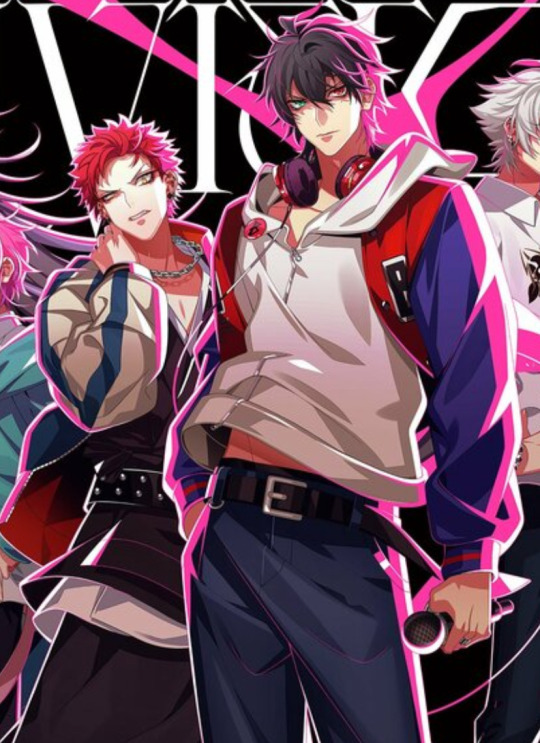
and any other art of them together usually has one of them standing behind the other lol. but here’s instances between canon/arb/rhyme anima that i can think of where they’re close to each other lol


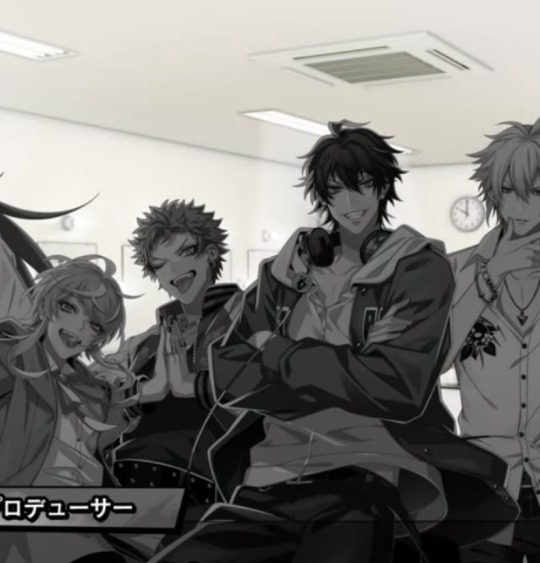
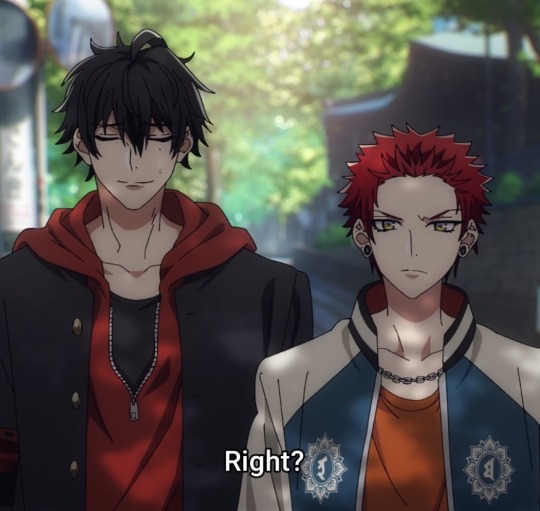
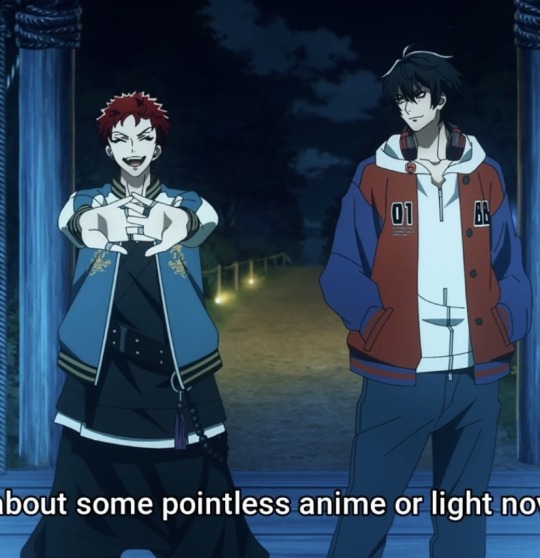
#vee queued to fill the void#it’s decently consistent tbh!!!!!!#like put kuukou’s eyes at around the mid way/base of ichiro’s neck and that’s probably the intented height difference lol#both guidebook show the naughty busters art with the same height difference#i think arb is okay for using heights as reference but do know that jakurai is actually too tall for the game deadass lol#and jyushi is a little taller than ichiro in arb as well lol like i think it his boots tbh but it’s something to keep in mind!!!!!!!#again not including the manga since kuukou and ichiro are deadass the same height sometimes lol
15 notes
·
View notes
Text
thinking about "murder is okay" still. more than anything i think a lot of people just say shit in meta bc it sounds evocative and vaguely gestures at an actual point
#i dislike the 'some people are not smart enough to review/critique/write' posts bc they're always phrased to invoke ontological capability#only for op to scramble and make it clear thats not what they meant at all guys when they obviously get pushback.#thus establishing them as one of the people who probably isn't smart enough for this.#but like it is true that some people are probably not thinking about it hard enough to write something interesting or revealing#or representative of some sort of broader understanding of the work and its themes and intentions#and are instead letting themselves be captured by whatever pitfalls in logical or moral consistency feels the best#many such cases! we are very good at this as people#crposting
7 notes
·
View notes
Note
since leo is eternally 15, wouldnt he be on floor 18? since Floor 19 is for everyone who died at 16.
fun fact I actually was just running through the HoO timeline to figure the ages thing out (mostly, honestly, because I wanted to figure out Jason's arrival and where that would place him). to Leo's end, that actually does place him at 16 years old (something I've already kicked myself for lmao), since his birthday passes before the battle with Gaea.
that said, regardless, general fanon belief of Valhalla has been that teenagers are grouped in mixed floors that are mostly age-appropriate (that is, for however many floors make up the youngest ages up to 19 years old). I imagine this is mostly a preference people have since, say, high schoolers all hang out with each other as an age group that is not inherently restricted to their particular age.
it's also probably derivative of our main canon description that is "you're in the youngest tier" which is a broader categorization. characters like TJ and Halfborn are mostly described as teens and not necessarily one age (with Halfborn in particular looking "maybe 18, tops" SoS 116)
now, I HAVE consistently mixed up both Jason and Leo's ages at the beginning of TLH and into BoO. while I'm with my copies of SoS and HoT to do my best with MCGA world building and consistency (or at least, be aware of when I'm breaking rules on purpose[ish]), I can't move my copies of BoO back to school with me (and frankly, wouldn't have the time to cross reference those books anyway).


literally me right before I decided I would spend 4 days dusting off my mcga hardbacks, cracking open photoshop, and launching this:
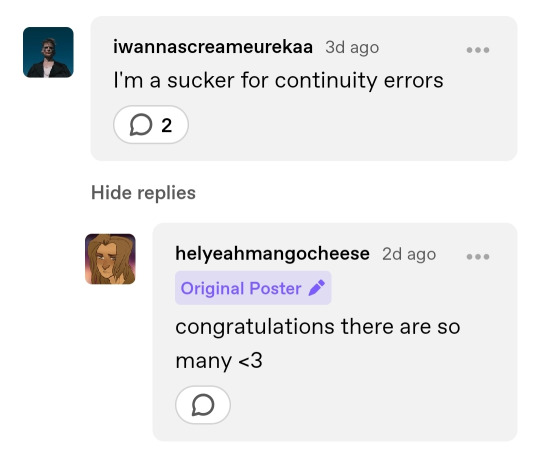

#I trust anon that this was w the best intentions but I am honestly just here for a good time lmao. and yes half of that fun for me is#Making It Work so I've dug through the wikis and whipped out all 3 mcga books but I'm probably not gonna find the time to#read them all in full and for consistency - mostly bc then I wouldn't have the time to do the fun job of creating any of the content!#that said I am also obsessive and I think it's a fun challenge to nitpick myself aswell. so trust that if you find a glaring inconsistency#I've already found it too!#not an ask#technically an ask but not in-universe whoops#Im happy to answer au questions ooc also I do love talking abt this with the moot#but yeah I dont know how to categorize this so Im not gonna LOL#mod talks
12 notes
·
View notes
Note
Idk how you do it. The way I get so mean when people drive me crazy, esp when they start talking edtwt stuff. I’d tell them either love yourself and unlearn your fatphobia or stfu
i mean its different when it's from people you know & care about. reactions differ from person to person & even if it's annoying, in this case there's prior history of body issues and loving yourself is always way easier said than done. it's unhelpful advice if it's used in that kind of combative way. there needs to be some grace, or a kinder way to make the conversation feel as absurd to him as it was to me so that we can get past it and talk about something else. sometimes its just not serious enough to argue about, but obnoxious enough to have to complain online for catharsis lol
#plus that guy changes his mind/goals/intentions every other week#zero consistency means i probably won't be dealing with that fixation for long so i can just coast and joke around it until he's done
4 notes
·
View notes
Note
the Silent Hill 2 remake is graphically "better" and gameplay is better BUT the original had such an uncanny valley feel. The character models and the way the lighting was rendered gives it a more surreal vibe.... basically you right
yeah, best way i can word it is that there was a clear shift in direction for me. sometimes for the better (i prefer remake angela, for instance), sometimes for the worse (maria :(), but either way, the execution is very different, as is the acting style, so it's kinda crazy to me to see so many people acting like they were both going for the same vibe when that was clearly not the case imo
#ask#honestly it's probably because that a lot of people believe that sh's dreamlike tone is a happy accident and not a deliberate choice#so the more natural sounding acting of the remake is seen as an easy improvement; a correction of a mistake basically#which is a conclusion born out of a false premise#not that the og actors weren't amateurish and cringe but the intent was always for them to sound a weird a possible#ps1/ps2 era games all had shit voice acting basically but none of them sound like silent hill. and it remained consistent through to 4#so yeah it was a choice. and the remake went with another direction
6 notes
·
View notes
Text
wish I could get (and stay) in the zone with writing like I can with drawing
#working on a pretty drawing is addictive I like compulsively come back to it#I can lose track of time while drawing uninterrupted#writing is fun but it's always very intentional I can't lose myself in it in the same way#probably why I struggle getting writing done consistently but I never feel like I have to make myself draw#anyway probably a mix of things but also writing is using some of the same braining that I have to use during the rest of the day#vs drawing feels almost mindless bc I get to use a different part of my brain than I do for work or whatever idk#just spitballing here#anyway my theory is that other people on here who always shock/impress me with their wordcount can achieve that kind of flow with writing#wonder if there's a way I could try and cultivate that
7 notes
·
View notes
Text
saw a post on here about giftedness and now im annoyed about the existence of special ed and gifted programs again
#taylor.txt#hold on i might elaborate on this if i can find the words but like#obligatory dont take this the wrong way. for all intents and purposes i am a special educator these days#i actually think i’ll probably go back to school within the year to get that official certification too which is like. lolz because in my#undergrad the classes that consistently pissed me off the most were the prerequesite classes i had to take to the graduate-level courses id#be taking for that. but in the meantime i will work on my mindfulness techniques ❤️ amen
2 notes
·
View notes
Text
yk it says something when Chrollo and Hanma are somehow the closest to main cast I have....
#mobile ooc#And Hanma is Consistent rather than main#And Chrollo is only main for set arc so#And not main main per se 🤔 main villain#I did write Kurapika once upon a time#But he's probably the least main out if the main 😂#It's not an intentional thing I swear#Xue yang main for his arc but thats like 2 episodes so AKDNFJD#OKAY TECHNICALLY SUWA but that's kinda like akudama drive#Everyone is main character bc there's so few
5 notes
·
View notes
Text
how do I describe this scent
#The description of this perfume on the website does it perfectly well but writing the guy he’s obviously not going to use#the fucking official description with all the different notes#But how even am I supposed to describe this combination of things#daffodil clary sage palisander rosewood and sclarene if anyone’s wondering#sclarene is a woody and earthy scented organic compound#palisander rosewood smells slightly woody but also slightly floral and fruity apparently#clary sage is apparently a bit floral and “herbaceous” so like sweeter plant smelling ig#I don’t even know how to describe daffodils with what I’ve seen#But dear viewer do you understand the problem???? These are all vaguely connected in the essence that they’re all Plant#There’s nothing consistent through all of them. The rosewood is apparently more of the base so I’m leaning towards floral or wood#I have smelled this man before when he was apparently wearing it but it was just in passing and because of proximity#rather than like intentional smelling. so I don’t remember it.#anyways with all this research I’m doing now I might as well become a perfumer#Now upon further investigation since floral seems to be something that fades faster and this is not exactly a story taking place#at the beginning of a day I will probably say it was more wood or like a forest. Since those scents stick around longer and leave more of#an impression apparently. aaaaa.#documented my entire research timeline in these tags have fun I guess I’m just posting it anyways.
1 note
·
View note
Text
Got to Harpy's Nest! I am absolutely picking up on the Ashe/Firi undertones more this watchthrough. The little star with "good" on it was VERY cute!!!
I'm also a big fan of the Gregor and Thog interactions in the nest. The two don't get a ton of 1-on-1 moments (iirc) so it's always fun to get to see how their dynamic plays out compared to the others with Thog!
It's interesting to me that they're the two people who feel guiltiest in the party (if that is in fact why they were picked); Thog's backstory is more of an unknown, but he hasn't seemed to feel very guilty before. Gregor's history with The Outriders-- the guilt makes sense, there, considering what we know about what went down. But then, Ashe and Markus both abandoned their families in their backstories, and have done things they've regretted within the last couple arcs of the show, and still they weren't picked! (Firi was also not picked, but atm I don't know enough about her backstory to compare anything. She doesn't seem to be harboring a ton of guilt, though)
All that is to say: these folks could really use a therapist
#wolfy speaks#thrilling intent#2k24 rewatch#i will probably keep that the tag even though its 2k25 now#just for consistency#ep 160#i know gregor and thog worked together against the... trolites(?) in the wizard highschool arc#and thats the only other example that really comes to mind#i think their dynamic is interesting in that gregor never seemed to hold any resentment towards Thog (iirc)#and Thog at the very least respects/trusts Gregor's expertise when it comes to monsters#thog is p sassy with ashe and markus but not so much w gregor#which might just be because the scenes where theyve had the most interactions with each other have been monster fights lol#in previous watchthroughs i feel like ive ignored gregor a bit in favor of shipping which i regret cus i missed out on a v interesting fella#gregor hartway is such a character. i love him
1 note
·
View note
Text
Y'know I should talk abt Otto more. I may have not that many thoughts on them but they're my special lil guy who torments me everyday by having the fun writing quirk of being actively misgendered when no other nonbinary character is to my knowledge. I also think they're a transfem nonbinary egg.
#rat rambles#oni posting#its so painful because theres a not insignificant chance thats it's just a genuine error thats going to be quietly changed at some point#but its also just So consistent and its stuff thats been around for a long time#so although idk if theyre intended to be an egg or be a nonbinary person who uses he/him or if its just a mistake#Im hoping for the first since its the most fun and interesting to me but it could be any of them#plus itd be actually rly cool if they at some point actually wrote one of their trans characters coming out or realizing they're trans#its probably a bit of a long shot but its not impossible#my bet is that the most we'll get in a hypothetical egg route is a further down the timeline log where they do use they/them#not because I think they're unwilling to write trans characters but mostly just because itd be hard to fit#most oni logs dont rly cover that sort of personal stuff and otto has already had an extended log where they have a mini arc#so while they Could get another log where they keep developing itd feel like a bit much since theyve already gotten a good bit of stuff#Im still hoping for a otto transgenderism log since itd be fun but Im trying not to count on it#its just a case where its hard to tell if its intentional or not since again every other nonbinary character is gendered correctly#so it'd either have to be some egg shit or the person who wrote their stuff thought they were a man#because the misgendering goes beyond pronouns consistently#we have our mr.kraus and some young man and the likes#and weve seen mx. used in dont starve before so itd be likely theyd know thats an option#so basically I have no clue whats up with this bastard and I hope they explodohwait
0 notes